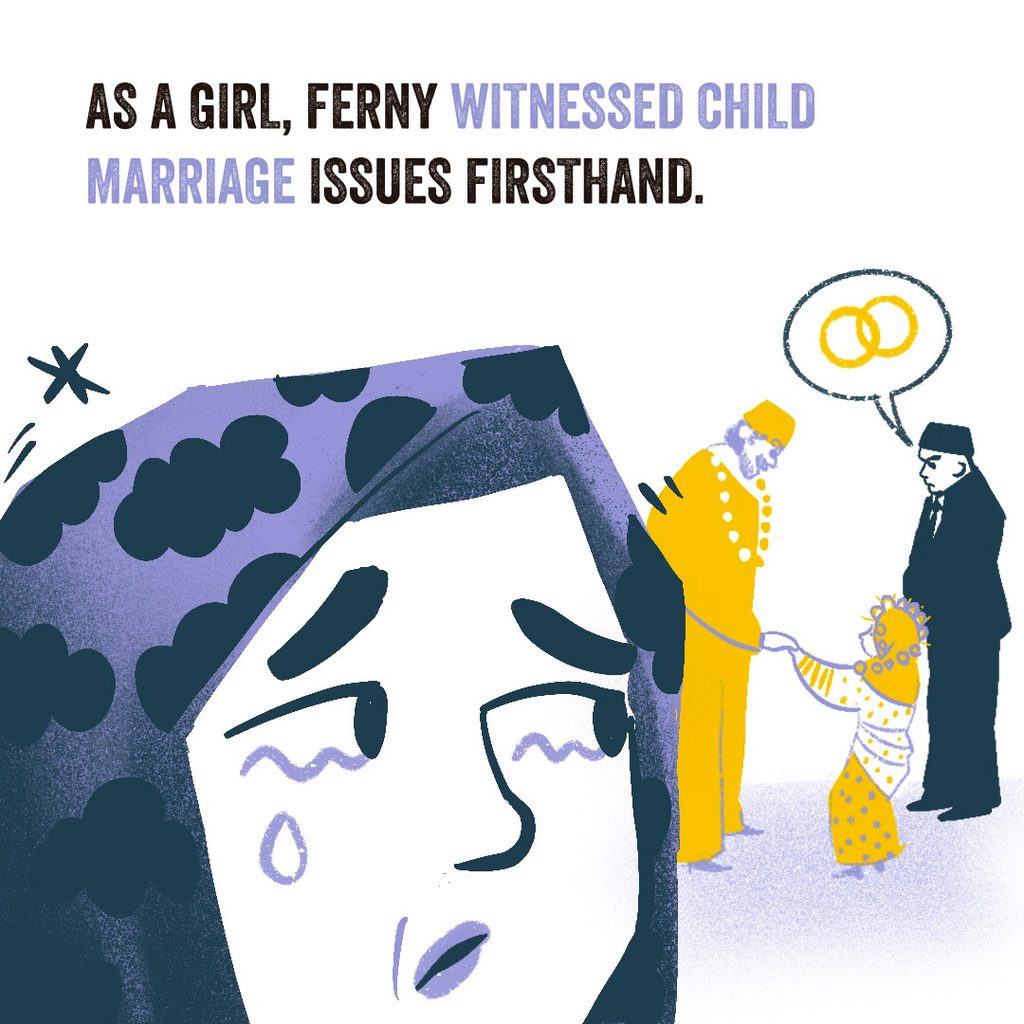Not Just a Girl, but an Activist Against Child Marriage – Ferny, 21, from Indonesia
17 January 2022<strong><span class="has-inline-color has-off-black-color">As part of Plan International’s 2021 Asia-Pacific Girls Report: Voice, Choice, and Power, the research looked into the individual stories of young female activists across the region empowering themselves in the fight for gender equality. Here, we take a look at one of these fearless leaders, 21-year-old Ferny, who is working for the Youth Coalition for Girls to help prevent child, early, and forced marriage (CEFM) in Indonesia.</span></strong>

“I think the poverty chain will not break while CEFM (child, early and forced marriage) still exists and the rate of maternal mortality and [school] drop out will increase.”
Child, early and forced marriage (CEFM) is a continuous concern in Indonesia. A 2018 survey revealed that one in every nine girls under the age of 18 were married in Indonesia, and the number of women aged 20-24 who were married before the age of 18 was estimated to be 1,220,900. Worryingly, despite a slow decrease in national CEFM rates, the report also found that 11 out of 34 provinces had an increase in CEFM between 2018 and 2019.
Many youths in Indonesia, particularly in rural areas, aren’t aware of the gender violence and discrimination CEFM can bring, as there are no spaces where they can discuss, learn and access information. As a result, many don’t see CEFM as a pressing issue.
Ferny witnessed these limitations firsthand and she felt a responsibility to stand up and be heard. “I see that young people around me are not aware of such issues, but I’m different because I’m educated, and my school has enough connection and also opportunity.”
Mobilisation as a youth advocate
Ferny wanted to use her awareness and education to contribute to gender equality and CEFM issues. That’s when she discovered the Youth Coalition for Girls (YCG), an organisation working for girls’ rights and equality in Indonesia, and her activism began.
“I felt my concern raised there, I felt I was part of it, and I did not want any children to experience child abuse or CEFM. I have not experienced CEFM myself, but I see around me that the consequences are terrifying.”
For the last four years, YCG has given Ferny the platform to focus on campaigns to prevent CEFM and violence against women. She has coordinated and joined several initiatives, engaging herself in efforts to stop CEFM.
Awareness building
Spoken like a true activist, Ferny believes in the importance of awareness-raising and uses her online platform to inform as many people as possible about CEFM. She challenges herself to create more and more awareness every day.
Ferny and her friends have collaborated with the YCG on many initiatives, including an intense online campaign called ‘16 days of activism for HAKTP (The International Day for the Elimination of Violence Against Women)’ in November 2020, aimed to build CEFM awareness during the pandemic. For 16 days, 2000 posts promoting prevention and consequences of CEFM, and live discussions on YCG’s Instagram were held. As of April 2021, 13,209 posts were uploaded with the #16HAKTP hashtag on Instagram, thanks to the collaboration with various organisations and other young female activists like Ferny.
“Although it was exhausting, and we were nervous and worried if we made a mistake, the result made me very happy. I was also happy because we did it together.”
Online activism is more important than ever
Through social media mobilisation, young female activists are able to get their messages across faster, easier, and at zero cost. The COVID-19 pandemic has made social media advocacy more important than ever. However, not all youths in Indonesia have good internet access and important messages are easily misrepresented and manipulated. Online campaigns provide an open space for questions and protests from communities that believe CEFM is acceptable.
Collaboration
Despite the protests, Ferny remains unperturbed. She believes the experience of being heard and influencing people is essential for her and other activists online. YCG’s connections with national networks and NGOs promoting youth-led advocacy, like Plan International, provide young female activists the platform to constantly collaborate and spread their messages out to those that need it.
It is within these collaborations that provide the impetus to many to help and spread the message.
“Our friends have helped to popularise [the CEFM issue] since the beginning. And what makes us successful is how we utilise our network. We involve youth from other areas as much as we can.”
More and more youth communities are being established with an awareness of gender equality. Ferny hopes that, in the next five years, all of these communities will continue working together and collaborating in a large network to improve gender equality in Indonesia.
2021 Asia-Pacific Girls’ Report: Voice, Choice, and Power
Plan International’s 2021 Asia-Pacific Girls’ report echoes this. Findings from the report emphasise how the rise of youth activism in Asia-Pacific is important for progressing gender equality, leadership, and promoting advocacy messages. Yet it also urges governments and civil society to work harder to support girls and young women, providing safe online and civic spaces for inclusion in decision making. Something Ferny also feels passionate about.
“As youth, we can work with the Government and are allowed to be involved before the Government makes a decision regarding policy; our thoughts are listened to and taken into consideration. I hope that in the future youth will be invited to be involved more in advocacy.”
Categories: Campaigns, Protection from violence, Youth empowerment



